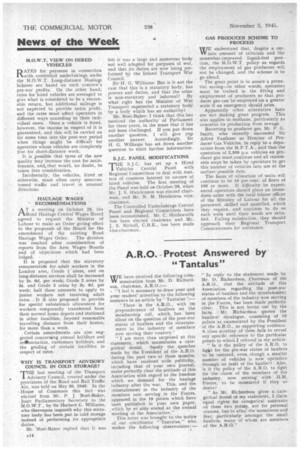News of the Week
Page 16

If you've noticed an error in this article please click here to report it so we can fix it.
M.O.W.T. VIEW ON HIRED VEHICLES
RATES for payment in connection with controlled undertakings under the M.O.W.T. Long-distance Haulage Scheme are based on each concern's pre-war profits. On the other hand, rates for hired vehicles are averaged to give what is considered to be a reasonable return, but additional mileage is not expected to provide extra profit, and the rates must affect operators in different ways according to their individual costs. Once a vehicle is. hired, however, the income in respect of it is guaranteed, and this will be carried on for some time into the post-war period when things might be difficult for operators whose vehicles are completely free for short-distance work.
It is possible that tyres of the new quality may increase the cost for maintenance, and,that would, no doubt, be taken into consideration.
Incidentally, the vehicles, hired or otherwise, must often carry unaccustomed traffic and travel in unusual directions.
HAULAGE WAGES " RECOMMENDATIONS
ATa: meeting on October 2$, the Road Haulage Central Wages Board agreed to request the Minister of Labour to make an Order giving effect to the proposals of the Board for the amendment of the existing Road Haulage Wages Order. The decision was reached after consideration of reports from the Area Wages •Boards and of objections which had been lodged. •
It is proposed that the statutory remuneraticrn for adult workers in the London area, Grade 1 areas, and on long-distance services shall be increased by 2s. 6d. per week; Grade 2 areas by 3s. and Grade 3 areas by 3s. 6d. per week; half these amounts to apply to junior workers not receiving adult rates. It fg also proposed to provide for special subsistence allowances for workers temporarily transferred from their normal home depots and stationed in Other localities, .beyond reasonable travelling distance from their homes, for more than a week.
Certain amendments are also suggested concerning ,annual holidays and refinnera lion, customary holidays, and the grading of certain localities in respect of rates.
WHY IS TRANSPORT ADVISORY COUNCIL IN COLD STORAGE?
U f"E last meeting of the Transport
Advisory Council, created under the provisions of the Road and Rail Traffic Act, was held on May 30, 1940. In the House of Commons this fact was elicited from Mr. P. J. Noel-Baker, Joint Parliamentary Secretary to the M.O.W.T., by Sir Herbert G. Williams, who thereupon inquired why this statutory body has been put in cold storage instead of performing its appropriate duties.
• Mr. 'Noel-Baker replied that it was felt it was a large and numerous body not well adapted for purposes of war, and that its duties are now being performed by the Inland Transport War Council.
Sir H. G. Williams: But is it not the case that this ia a statutory body, has powers and duties, and that the other is non-statutory and informal? By what right has the Minister of War Transport superseded a statutory bodY by a body which has no authority? Mr. Noel-Baker: I think that this has received the authority of Parliament for three years, in the sense that it has not been challenged. If you put down. another question, I will give ycut another answer. Accordingly, Sir H. G. Williams has set down another question to elicit further information.
S.J.C. PANEL MODIFICATIONS
THE S.J.C. has set up a Hired Vehicles Cential Panel with Regional Committees to deal with matters of common interest to owners of hired vehicles. The first meeting of the Panel was held on October 26, when Mr. J. S. Hutchinson was elected chairman, and Mr, N. M. Henderson vicechairman.
The Controlled Undertakings Central Panel and Regional Committees have been reconstituted. Mr. C. Holdsworth has been elected chairman and Mr. J. S. Nicholl, CUE., has been made vice-chairman. GAS PRODUCER SCHEME TO PROCEED understand that, despite a cer tain amount of criticism and the somewhat-improved liquid-fuel position, the M.O.W.T. policy as regards the employment of gas producers will not be changed, and the scheme is to go ahead.
The great point is to assure a potential saving—in other words, operators must be trained in the fitting and employment of producers so that producer gas can be employed on a greater scale if an emergency should arise.
Apparently other alternative fuels are not making great progress. This also applies to methane, particularly as concerns its production from sewage.
Reverting to producer gas, Mr. F. G. Smith, who recently succeeded Sir Alfred Faulkner as Director of Producer Gas Vehicles, in reply to a deputation from the M.P.T.A., said that the operation of 2,500 p.s. vehicles on producer gas must continue and all reasonable steps be taken by operators to get this number of vehicles into use at the earliest possible date.
The basis of allocation of units, will continue to be 10 per cent, of fleets of 100 or more. If difficulty be experienced operators should place an immediate order with the local.labour officer of the Ministry of Labour for all the personnel, skilled and unskilled, which they require, and continue to do so' each week until their needs are satisfied.. Failing satisfaction, they should approach their Regional Transport Commissioners for assistance.




















































